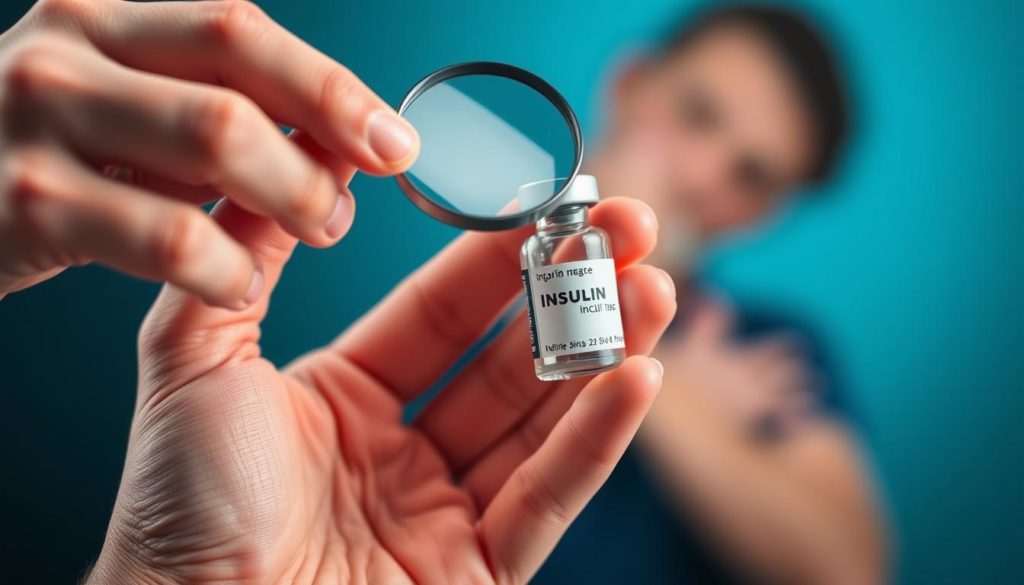About 1 in 5 people using insulin may face an overdose at some point. Knowing how to handle this is crucial. An insulin overdose can cause hypoglycemia. This condition brings symptoms like anxiety, confusion, hunger, fatigue, irritability, and sweating.
Act fast if there’s an insulin overdose. Check your blood sugar first. Then, quickly eat or drink something sweet. Follow up with a meal to help stabilize your blood sugar. Always rest and keep an eye on how you’re feeling.
People often overdose by misreading syringes or using the wrong insulin type. Skipping meals or exercising after taking insulin can also cause it. If symptoms don’t improve or if your blood sugar stays low, get medical help right away.
Understanding Insulin Overdose
Insulin overdoses are dangerous and need careful attention. Knowing insulin doses and their effects is vital. It’s also important to know the different insulin types, such as basal and bolus. Factors that affect dose also play a role.
“Knowledge is the best prevention against insulin overdose complications. Understanding your insulin regimen is crucial.” – ADA (American Diabetes Association)
Education is key to using insulin safely and effectively. Awareness of the insulin types and their roles is essential.

| Insulin Type | Description | Role in Blood Sugar Control |
|---|---|---|
| Basal Insulin | Long-acting insulins, administered once or twice daily. | Maintains steady blood sugar levels over 24 hours. |
| Bolus Insulin | Rapid-acting insulins, taken before meals. | Helps control blood sugar spikes from meals. |
Using basal and bolus insulins together helps control blood sugar well. This method prevents insulin overdose issues. It ensures balanced glucose levels all day.
Insulin pens, smart devices, and glucose diaries are crucial for preventing insulin overdose. They make insulin management easier. They also remind you to avoid dosage mistakes.
To avoid insulin overdose issues, understand the different insulins and importance of dose accuracy. Knowing how external factors influence doses is crucial. With proper knowledge and tools, managing insulin safely is possible.
Signs and Symptoms of Insulin Overdose
It’s vital to know the signs of too much insulin to act fast. Knowing both mild and severe symptoms helps you react on time.

Mild Symptoms
Mild symptoms of taking too much insulin include:
- Confusion or “brain fog”
- Irritability and anxiety
- Depression
- Shakiness and dizziness
- Rapid heartbeat
- Excessive sweating
- Blurred vision
Seeing these signs means you need to fix your blood sugar levels quickly.
Severe Symptoms
Severe symptoms mean you need help right away, as things can get worse fast. These serious signs are:
- Difficulty concentrating
- Seizures
- Loss of consciousness, also known as insulin shock
These urgent symptoms call for fast action to avoid a coma or worse. It’s essential to know and act on these severe signs to save lives.
Common Causes of Insulin Overdose
Knowing why insulin overdoses happen helps us manage them better. Using syringes wrong, not planning meals well, and injecting insulin before exercising can all cause overdoses. We’ll look closer at these reasons to get better at dealing with insulin overdose.
Misreading Syringes or Vials
A lot of overdoses happen because people read syringes or vials wrong. Insulins differ in strength (U-100, U-200, etc.). Not spotting these differences can cause a big mistake in dosage. Paying close attention to these details is really important.
Using the Incorrect Type of Insulin
Using the wrong insulin type, like choosing long-acting over rapid-acting, is another overdose cause. It’s vital to make sure you’re using the right insulin at the right time. This helps a lot in preventing overdoses.
Skipping Meals After Insulin Injection
Taking insulin but not eating can drop your blood sugar too much. It’s key to eat when you take your insulin to avoid an overdose. Good meal planning is a big part of managing overdoses.
Injecting Insulin Before Physical Activity
Exercise changes how fast your body absorbs insulin. It’s important to schedule your workouts carefully if you take insulin. Not doing this can lead to taking too much by accident. So, matching your insulin shots and exercise is crucial.
Handling Insulin Overdose
Taking quick and correct actions in an insulin overdose is vital. It helps avoid serious health issues.
Immediate Steps to Take
Here’s what to do in an insulin overdose:
- Check the blood sugar level right away.
- Consume fast-acting glucose, such as glucose tablets or fruit juice.
- Monitor symptoms closely and be ready to react if things don’t get better.
Rest and Recheck Blood Sugar
After first aid, rest and check your blood sugar again. Do this 15-20 minutes after eating glucose. If it’s still low, you might need more glucose.
Checking ensures the overdose is being handled properly.
When to Seek Medical Attention
If symptoms stay the same or blood sugar doesn’t get better, get medical help. In serious cases, like if someone is unconscious or having seizures, call 911 right away. Doctors provide treatments that home care can’t.
Emergency Actions for Severe Insulin Overdose
In an insulin overdose emergency, quick action is key. The first step for a handling severe insulin overdose is to check how the person is doing. If they are awake, they need sugar fast. This includes eating sweets, glucose tablets, or drinking sugary drinks.
If the person is out cold, they need help right away. Someone should have already dialed 911. If you can, give them a glucagon shot to fight the insulin’s effects. Remember, this is only until the experts get there. Doctors will give IV dextrose and fluids to stabilize them.
| Actions | Conscious Individual | Unconscious Individual |
|---|---|---|
| Initial Steps | Consume fast-acting glucose | Call 911, administer glucagon |
| While Waiting for Help | Stay awake and monitor blood sugar | Ensure airway is clear, stay with the person |
| Professional Medical Steps | Monitor and support | Administer IV dextrose and electrolyte solution |
Knowing what to do in an insulin overdose emergency can save a life. Being ready and knowing the right steps for a handling severe insulin overdose allows people to act quickly and right in these critical times.
Role of Glucagon in Insulin Overdose
When dealing with an insulin overdose, glucagon is vital. Knowing how it works and how to use it helps manage emergencies well.
What is Glucagon?
Glucagon is a hormone that counters insulin by raising blood sugar. It’s key for treating low blood sugar, or hypoglycemia. Without enough blood sugar, a person may feel confused, have seizures, or faint.
When to Use Glucagon
Use glucagon if someone can’t eat or drink to increase blood sugar. It’s vital for when someone is unconscious or can’t swallow. Using glucagon right can lead to a quick recovery instead of serious problems.
How to Administer Glucagon
Giving glucagon is simple but needs careful steps. Each kit has a vial of powder and a syringe with liquid. Follow these steps:
- Mix the powder and liquid in the syringe as directed.
- Then, pull the mixed solution back into the syringe.
- Inject it into the patient’s arm, thigh, or buttocks.
Using glucagon correctly can quickly fix low blood sugar from insulin overdose. After the shot, always get medical help for further care and checking.
Preventing Insulin Overdose
It’s key to understand and use strategies to stop insulin overdose. Sticking to a regular plan and being careful can greatly lower the chances of insulin problems.
Maintaining a Consistent Schedule
Keeping a regular schedule is critical to avoid too much insulin. Make sure you take your insulin at the same time every day. Alarms or apps can help you remember your insulin dosage.
Meal Planning and Timing
Planning your meals and eating on time are important to prevent too much insulin. You should eat regularly to match your insulin shots, which stops your blood sugar from dropping too much. Read food labels and keep an eye on carbs to prevent unexpected insulin jumps.
Being Prepared for Emergencies
Preparing for emergencies is crucial to prevent insulin overdose. Have a glucagon kit ready and wear a medical ID that shows you use insulin. Make sure your family and people who care for you know about your insulin schedule. This preparation helps handle emergencies well and keep you healthy.
| Prevention Tips | Importance |
|---|---|
| Maintain a consistent insulin schedule | Ensures proper medication control |
| Plan and time your meals effectively | Prevents low blood sugar levels |
| Carries emergency glucagon kits | Enables immediate action in emergencies |
| Wear a medical alert bracelet | Provides crucial information in emergencies |
Adopting these methods can change how you manage your insulin. It leads to better health overall.
Long-Term Health Effects of Insulin Overdose
Understanding the long-term effects of insulin overdose is vital. It requires more than just quick fixes. Repeated low blood sugar from too much insulin can cause serious health problems.
Chronic hypoglycemia from too many insulin overdoses can lead to dangerous situations. These include seizures or even coma. Consistently low blood sugar can harm your brain’s functions. It might cause memory issues and make concentrating hard.
Heart health can suffer too. Frequent low blood sugar episodes put stress on the heart. This increases the risk of heart disease and other heart-related problems. That’s why careful insulin management and medical advice are crucial.
Being well-informed and careful can help prevent and manage insulin overdose’s long-term health effects.
Factors Influencing Insulin Dosage
It’s vital to manage insulin dosage for controlling diabetes. Both basal insulin and bolus insulin help regulate blood sugar. However, many factors can change how effective they are. Knowing these can improve treatment and reduce risks.
Types of Insulin: Basal vs. Bolus
Insulin comes in two main types:
- Basal insulin: This type works all day to keep blood glucose levels steady when you’re not eating.
- Bolus insulin: This is used at meal times to manage the sudden rise in blood sugar from food.
Dosage Calculation
Getting the insulin dosage right is key to avoid problems like low blood sugar. This process usually involves:
- Figuring out how sensitive you are to insulin
- Keeping track of carbs eaten
- Setting goals for blood sugar levels
External Factors: Activity and Meal Content
Exercise and what you eat greatly affect insulin needs. For example, intense exercise can drop blood sugar, leading to less insulin needed. Meanwhile, meals with lots of carbs may mean you need more bolus insulin. It’s crucial to adjust your insulin dose based on these outside factors to keep your blood sugar steady.
| Factor | Impact on Insulin Dosage |
|---|---|
| Physical Activity | Typically reduces the need for insulin |
| Meal Content | Meals rich in carbs require more bolus insulin |
| Insulin Sensitivity | Being more sensitive to insulin lowers the amount needed |
Tools and Tips for Managing Insulin Dosage
Effectively managing insulin dosage can be key to keeping blood sugar levels right. Using advanced tools like smart insulin pens helps a lot. Alongside, traditional methods such as glucose diaries are useful too. Getting advice from healthcare providers makes this approach even better. It ensures insulin management is both tailored and precise.
Insulin Pens and Smart Devices
Smart insulin pens are vital for many with diabetes. These devices make taking insulin easier and track dosages to reduce mistakes. They have reminders and record detailed histories, making them accurate and reliable for managing dosages.
Using Glucose Diaries
Although high-tech solutions are available, old-school glucose diaries are still very valuable. Recording daily blood sugar levels, meals, and activities helps. It helps to spot how different things impact insulin needs. This makes insulin management more accurate.
Consulting Healthcare Providers
Even with advanced dosing tools, don’t skip seeing healthcare providers. They give personalized advice based on your health history and lifestyle. For deeper insights into managing insulin and avoiding overdoses, it’s crucial. Visit reliable resources and talk openly with doctors.
FAQ
What are the immediate steps to handle an insulin overdose emergency?
First, check blood sugar levels right away. Then, have some sugar, like a drink or candy. If needed, eat something to help stabilize blood sugar. Rest and keep an eye on the situation. Seek medical help if symptoms don’t improve.
What are the common signs of insulin overdose?
Common signs are feeling anxious, confused, very hungry, tired, and irritable. You might sweat a lot. Lesser signs include shakiness and feeling dizzy. If you find it hard to think, have seizures, or faint, get medical help right away.
How can I prevent insulin overdose?
To prevent an overdose, read labels carefully. Know the different types of insulin. Eat meals at the same times each day. Make sure you are accurate when calculating your dose. Use apps or devices to help keep your doses safe.
What should be done if blood sugar remains low despite consuming glucose?
Check your blood sugar again after a little while. If it’s still low, have more glucose. If you’re still feeling bad or it gets worse, get medical help immediately.
What role does glucagon play in treating insulin overdose?
Glucagon is used to fight an insulin overdose. It raises blood sugar when it gets too low. Use it if you can’t have sugar or if you’re unconscious. You’ll use a kit to give an injection.
What are the long-term effects of repeated insulin overdose?
Having overdoses often can cause serious hypoglycemia. This might lead to seizures, a coma, or even death. Constant low blood sugar can hurt your brain function and heart health. It’s very important to manage your insulin properly.
How does misreading syringes or vials contribute to insulin overdose?
Misreading vials or syringes leads to taking too much insulin. Always double-check your dose. Use the right techniques to measure to prevent mistakes.
What is the difference between basal and bolus insulin?
Basal insulin helps control blood sugar all day. Bolus insulin deals with blood sugar spikes when you eat. Knowing the difference is key for accurate dosing.
Why is it important to have a consistent schedule for insulin injections?
An regular schedule helps keep your blood sugar stable. It stops accidental overdoses. It ensures your meals and insulin work well together.
How does physical activity affect insulin dosage?
Exercise makes your body use insulin more, which could lower blood sugar too much. Adjust doses as needed. Always watch your blood sugar when you’re active.
What tools can help manage insulin dosage effectively?
Insulin pens, smart gadgets, glucose logs, and doctors’ advice are key for managing insulin. They help with precise dosing and better diabetes care.


